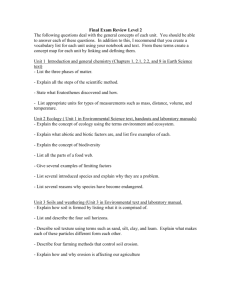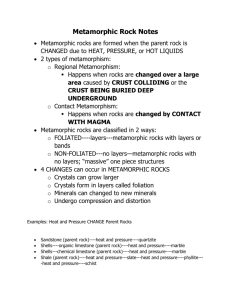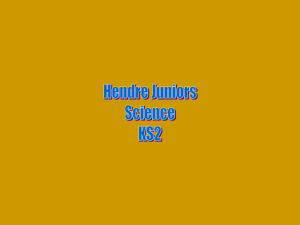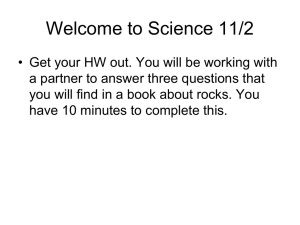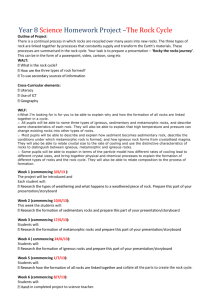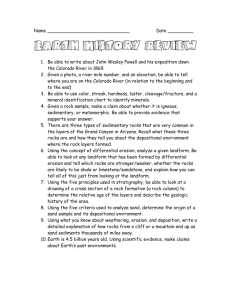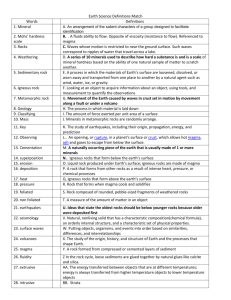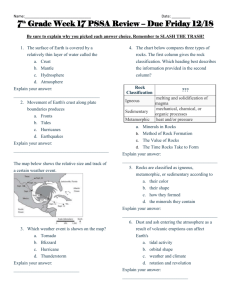geo.101.outline.f2010 - Student Learning Outcomes (SLO)
advertisement
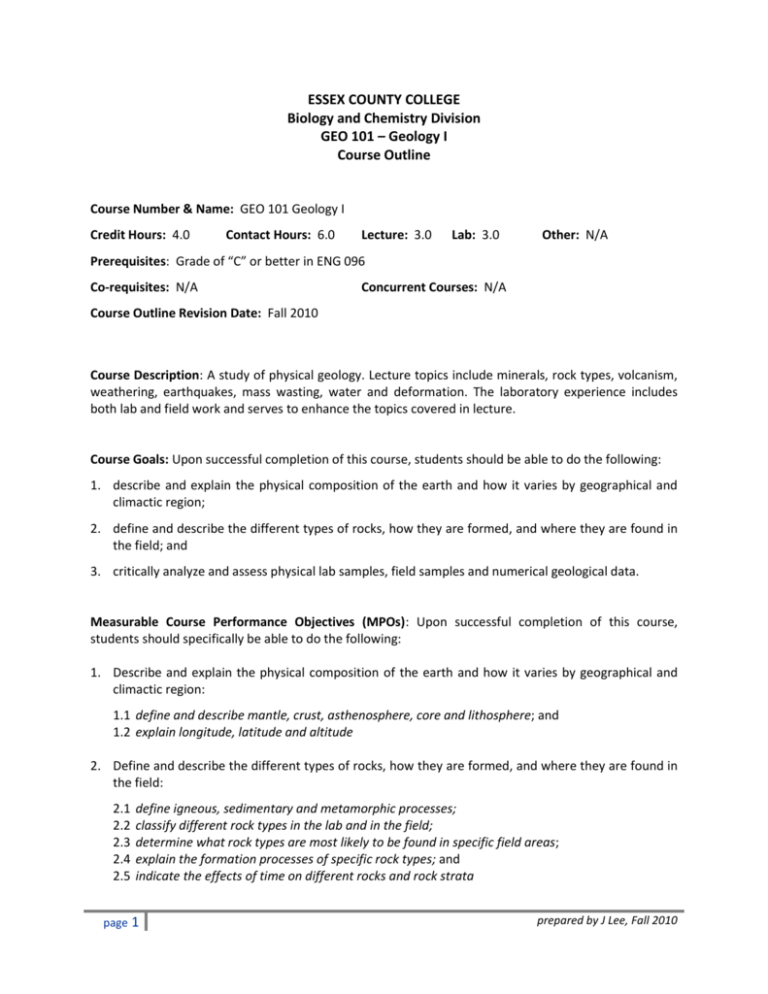
ESSEX COUNTY COLLEGE Biology and Chemistry Division GEO 101 – Geology I Course Outline Course Number & Name: GEO 101 Geology I Credit Hours: 4.0 Contact Hours: 6.0 Lecture: 3.0 Lab: 3.0 Other: N/A Prerequisites: Grade of “C” or better in ENG 096 Co-requisites: N/A Concurrent Courses: N/A Course Outline Revision Date: Fall 2010 Course Description: A study of physical geology. Lecture topics include minerals, rock types, volcanism, weathering, earthquakes, mass wasting, water and deformation. The laboratory experience includes both lab and field work and serves to enhance the topics covered in lecture. Course Goals: Upon successful completion of this course, students should be able to do the following: 1. describe and explain the physical composition of the earth and how it varies by geographical and climactic region; 2. define and describe the different types of rocks, how they are formed, and where they are found in the field; and 3. critically analyze and assess physical lab samples, field samples and numerical geological data. Measurable Course Performance Objectives (MPOs): Upon successful completion of this course, students should specifically be able to do the following: 1. Describe and explain the physical composition of the earth and how it varies by geographical and climactic region: 1.1 define and describe mantle, crust, asthenosphere, core and lithosphere; and 1.2 explain longitude, latitude and altitude 2. Define and describe the different types of rocks, how they are formed, and where they are found in the field: 2.1 2.2 2.3 2.4 2.5 define igneous, sedimentary and metamorphic processes; classify different rock types in the lab and in the field; determine what rock types are most likely to be found in specific field areas; explain the formation processes of specific rock types; and indicate the effects of time on different rocks and rock strata page 1 prepared by J Lee, Fall 2010 Measurable Course Performance Objectives (MPOs) (continued): 3. Critically analyze and assess physical lab samples, field samples and numerical geological data: 3.1 3.2 3.3 3.4 compare and analyze topographical maps; classify rock samples; distinguish and qualitatively date rock strata; and explain land form, mass wasting and shoreline development and deconstruction Methods of Instruction: Instruction will consist of lecture, discussion, laboratory procedures, data analysis, and field studies. Outcomes Assessment: Exam questions are blueprinted to course objectives. Checklist rubrics are used to evaluate students’ achievement of some lab objectives. All grading components are analyzed to determine the level of student performance on these assessment instruments in regards to meeting course objectives. The results of this data analysis are used to guide necessary pedagogical and/or curricular revisions. Course Requirements: All students are required to: 1. Attend classes. NOTE: Accumulative absences of more than four (4) sessions may adversely affect students’ grades. 2. Be punctual for class. Latecomers distract both fellow students and the instructor. Attendance will be taken at the beginning at each class session. 3. Complete all assignments and submit them as scheduled. No assignment will be accepted if it is more than one (1) week late. Any late submission must have prior instructor approval. 4. Achieve a minimum grade of “C” (course average of at least 70%) in order to pass this course. 5. Not eat or drink in the class. 6. Not bring children into the classroom. Children can be a distraction to other students and any class discussions. Also, bringing children into the classroom violates ECC policy. Other childcare arrangements are the responsibility of each student. 7. Maintain academic integrity. Cheating in any form or on any assignment is unfair and robs students of the right to learn through self-discipline, analysis and application of material to which they are exposed. Cheating requires an “F” grade, which will be given for that specific assignment or in-class examination. 8. Take exams as scheduled. No make-up exams will be allowed without prior arrangements being made with the instructor. In the rare case when a make-up exam is permitted, it must be taken when scheduled. 9. Not use cell phones or other electronic devices during lectures and examinations. Audio taping lectures is permitted only for those students with proper documentation from the Office for Services for Students with Disabilities. page 2 prepared by J Lee, Fall 2010 Methods of Evaluation: Final course grades will be computed as follows: Grading Components % of final course grade 3 or more Lecture Exams (dates specified by the instructor) Exams will show evidence of the extent to which students meet lecture-based course objectives. 50 – 60% 2 or more Lab Exams Lab exams will show evidence of the extent to which students meet laboratory-based course objectives. 20 – 30% Final Exam The comprehensive final exam will examine the extent to which students comprehend and have synthesized both lecture and laboratory course material and have achieved all course objectives. 20 – 30% NOTE: The instructor will provide specific weights, which lie in the above-given ranges, for each of the grading components at the beginning of the semester. Academic Integrity: Dishonesty disrupts the search for truth that is inherent in the learning process and so devalues the purpose and the mission of the College. Academic dishonesty includes, but is not limited to, the following: plagiarism – the failure to acknowledge another writer’s words or ideas or to give proper credit to sources of information; cheating – knowingly obtaining or giving unauthorized information on any test/exam or any other academic assignment; interference – any interruption of the academic process that prevents others from the proper engagement in learning or teaching; and fraud – any act or instance of willful deceit or trickery. Violations of academic integrity will be dealt with by imposing appropriate sanctions. Sanctions for acts of academic dishonesty could include the resubmission of an assignment, failure of the test/exam, failure in the course, probation, suspension from the College, and even expulsion from the College. Student Code of Conduct: All students are expected to conduct themselves as responsible and considerate adults who respect the rights of others. Disruptive behavior will not be tolerated. All students are also expected to attend and be on time for all class meetings. No cell phones or similar electronic devices are permitted in class. Please refer to the Essex County College student handbook, Lifeline, for more specific information about the College’s Code of Conduct and attendance requirements. page 3 prepared by J Lee, Fall 2010 Course Content Outline: based on the texts Physical Geology, 6th edition, by Monroe and Wicander; published by Cengage/Brooks Cole; and Laboratory Manual in Physical Geology, 8th edition, by Busch & Tasa; published by Pearson Week Lecture Content: Chapter/Topic Lab Content: Lab #/Topic 1 Chs 1 & 2: Understanding Earth Processes and Plate Lab 1: Measuring Earth Tectonics Materials 2 Ch 3: Minerals Lab 3: Mineral Identification 3 Ch 4: Igneous Rocks Lab 5: Igneous Rocks 4 Ch 5: Volcanoes Lab 2: Plate Tectonics Lecture Exam #1 on Chs 1 – 5 5 Ch 6: Weathering and Erosion Lab 4: Rock Cycle 6 Ch 7: Sedimentary Rocks Lab 6: Sedimentary Rocks 7 Ch 8: Metamorphic Rocks Lab 7: Metamorphic Rocks 8 Ch 9: Geologic Time Lab 8: Rock Dating & Fossils Lecture Exam #2 on Chs 6 – 9 Lab Exam #1 on Labs 1 – 8 9 Chs 10 & 11: Earthquakes and Earth’s Interior Lab 16: Earthquakes 10 Ch 12: The Seafloor Lab 9: Topographical Maps 11 Ch 13: Deformation and Continent Evolution Lab 10: Geological Structures 12 Chs 14 & 15: Mass Wasting and Running Water Lab 11: Mass Wastage Lecture Exam #3 on Chs 10 – 15 13 Chs 16 & 17: Groundwater and Glaciers Labs 12 & 13: Groundwater and Glacial Processes 14 Chs 18 & 19: Deserts and Shorelines Labs 14 & 15: Dryland Landforms & Coastlines Lab Exam #2 on Labs 9 – 16 15 page 4 Final Exam on all course material covered in lectures and labs prepared by J Lee, Fall 2010
